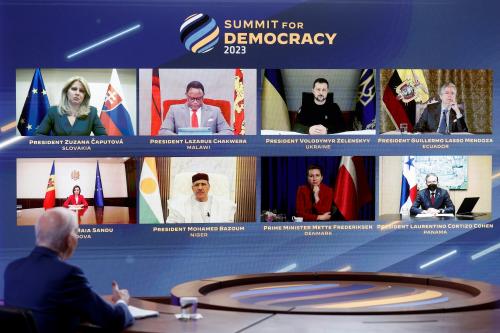On December 6, the Brookings Institution held an inaugural event for the newly launched Anti-Corruption, Democracy, and Security (ACDS) project, focused on addressing the most difficult corruption challenges globally. At the event, participants marked the second anniversary of the U.S. Strategy on Countering Corruption and focused on priorities in the lead up to the upcoming 10th Conference of the States Parties (CoSP) to the UN Convention against Corruption (UNCAC) in Atlanta, Georgia.
The event kicked off with a fireside chat between Brookings Senior Fellow Ambassador Norman Eisen (retired) and USAID Assistant to the Administrator of the Bureau for Democracy, Human Rights, and Governance (DRG) Shannon Green. Green spoke to the progress made by USAID and the U.S. government in advancing the U.S. Strategy on Countering Corruption, including increasing support for civil society and independent media internationally. She also highlighted U.S. aid to support the implementation of commitments made by countries at the first Summit for Democracy. Eisen highlighted that dozens of countries have made anti-corruption commitments since the Summit in December 2021 and emphasized the importance of analyzing commitments, including progress and challenges with respect to their implementation.
Green pointed to U.S. government efforts to elevate and recognize corruption as a threat to national security and democracy. The prioritization of corruption by the White House, Congress, and State Department has translated into expanded USAID assistance for countries actively willing to combat corruption. “We’re not just saying ‘you need to do X, Y, Z’” said Green, “but we actually have money and programs that we can bring to the table.” Green also focused on the U.S. acting resolutely and humbly when addressing corruption globally, with the recognition that corruption is a domestic challenge as well.
Following the fireside chat, ACDS Senior Director Jonathan Katz moderated a panel discussion on how stakeholders from across key sectors can prevent and combat corruption and bolster democracy. Moldovan Minister of Justice Veronica Mihailov-Moraru, Co-CEO of Accountability Lab Cheri-Leigh Erasmus, Editor in Chief of the Organized Crime and Corruption Reporting Project (OCCRP) Miranda Patrucic, and CEO of the Center for International Private Enterprise (CIPE) Andrew Wilson discussed advancing policy responses, priorities, and challenges with respect to implementing inclusive, sustainable, and comprehensive solutions to corruption.
Mihailov-Moraru and Patrucic explained the impact and risks that corruption by autocrats and malign actors, including in Russia, pose to democracy and security. Mihailov-Moraru discussed the recent democratic and judicial reforms undertaken by Moldova, which factored in the European Commission’s recent recommendation to advance its EU candidate status. She acknowledged the systemic problems of corruption in Moldova but also commended the resilience Moldovans displayed in the face of security challenges from the Russian invasion of Ukraine. Mihailov-Moraru praised the ongoing partnerships between the U.S. and Moldova, explaining that cooperation is needed to address extraterritorial corruption.
Patrucic unpacked the effects of democratic backsliding and increased authoritarianism are having on investigative journalism: “Countries are becoming much more blunt and open on how they’re targeting the media.” However, she also expressed hope about the increased interest in investigative journalism, and the impact of recent exposés on enablers of corruption.
Wilson and Erasmus discussed the importance of working across multiple sectors, including civil society and the private sector, to effectively combat corruption. Erasmus highlighted the important role that youth play in combatting corruption: “They’re not just the next generation, they’re the now generation.” Wilson discussed how to work with the private sector. “There used to be skepticism within the private sector on taking on corruption, but there’s been a sea change since then,” he noted. Some strategies Wilson highlighted included working with business associations and upholding examples of local businesses fighting corruption.
In 2024, ACDS will build on the event to launch multistakeholder communities of learning and action to explore key anti-corruption issues. To learn more about ACDS, listen to the recent podcast episode of The Current featuring Eisen.
The Brookings Institution is committed to quality, independence, and impact.
We are supported by a diverse array of funders. In line with our values and policies, each Brookings publication represents the sole views of its author(s).







Commentary
Key takeaways from “Tackling global corruption to strengthen democracy and security”
December 12, 2023